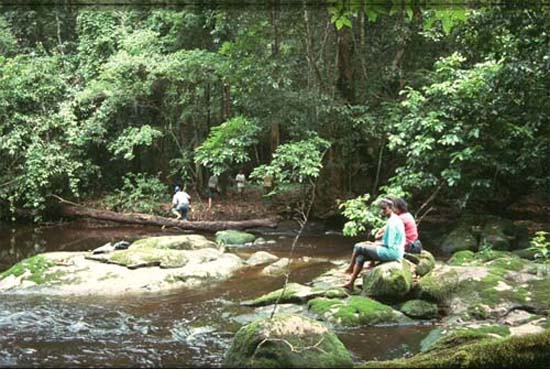
Kimberly Graber was "totally freaked out" when she wound up in a tiny village in the South American country of Suriname, it ended up being a great experience for the two years that she was there.
Spotlight on … Kimberly Graber
Anne Heishman
10/22/2002 (Uploaded on 10/29/2002 2:21:42 PM)
Kimberly Graber (1D) certainly didn't join the Peace Corps to find a husband, but that's exactly what happened. Graber, a graduate of Berkeley and a native of Northern Virginia, decided to join the Peace Corps a few years after college because she "wanted to do something that made a difference and made the world a better place." And although she was "totally freaked out" when she wound up in a tiny village in the South American country of Suriname, it ended up being a great experience for the two years that she was there.
Suriname, formerly known as Dutch Guyana, is located north of Brazil and east of Venezuela and is the smallest independent country in South America. (Suriname was granted independence from the Netherlands in 1975.) Its population of 400,000 occupies only 20% of the country while the remaining 80% is a tropical rain forest. The village that Graber lived in was over 100 miles from the only real city; villagers travel by boat to reach it as there are no roads.
Graber spent about three months living in the capital of Suriname, training and learning the lingua franca (Sranang Tongo), before moving to her village of 225 people. Although the official language is Dutch, many villagers speak their native language. Almost everyone in Suriname speaks Sranang Tongo, a Creole language. Because Graber was the first Peace Corps volunteer in this village, her first challenge was to be accepted by the villagers, who really had "no idea why she was there." This involved learning their culture and spending a lot of time talking with the people to find out how they wanted to improve their community. Her primary goal as a rural community development worker was to facilitate villagers working together to articulate local improvements they envisioned and then to assist in designing projects to reach those goals.
Graber spent months living in temporary housing while her permanent home was being built (the Peace Corps provides the building materials while the villagers provide the labor). When completed, her home was situated on the banks of a river underneath shady mango and avocado trees. As Graber noted, "[I] would never be able to have property like this in the United States." Although the temperature is very warm year-round, the constant breeze from the river and the multitude of shady trees made for a temperate living environment, according to Graber. This is important since the villagers spend "about 90% of their time outdoors."
Although the water conditions were primitive (she used a tank that collected rainwater for her water supply) and there was no electricity, Graber "got used to the culture very quickly." In fact, she soon found herself bathing and washing clothes in the nearby river along with her neighbors. Graber also became enamored of the native food, including cassava, a root that "looks like a big yam or sweet potato" and can be used to make a variety of foods, including bread, soup and even beer.
After the first year, Graber became close with a native Surinamese named Ricardo, who became her future husband. At the end of her two-year stint, Graber and Ricardo moved back to the United States and married in November 2000. Although it is a big adjustment, the couple has support from Graber's family, almost all of who live in the Northern Virginia area. Ricardo is working in catering at Wolf Trap and attending classes. For her part, Graber is "happy that she [joined the Peace Corps] but glad to be home."
It was while she was working as a paralegal for first the FTC, and now the Department of Transportation, that Graber made the decision to attend law school. She enjoys "having her brain challenged" and "really likes the professors here." Although she enjoys policy and working for the government, she "really wants to see what other options law school has to offer." With her background, she will undoubtedly have many career options to pursue.
